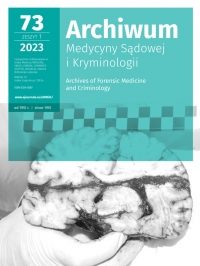Expression of human cardiac-specific genes: a novel method for post-mortem interval estimation
Expression of human cardiac-specific genes: a novel method for post-mortem interval estimation
Author(s): Sahil Thakral, Purvi Purohit, Anupama Modi, Richa Mishra, Arvind Sinha, Puneet SetiaSubject(s): Social Sciences, Sociology, Health and medicine and law
Published by: Wydawnictwo Uniwersytetu Jagiellońskiego
Keywords: cardiac troponin I; fold change expression; forensic genetics; GAPDH; N-terminal pro-B-type natriuretic peptide; post-mortem interval
Summary/Abstract: In legal medicine, the determination of post-mortem interval (PMI) is not only an important but also one of the most difficult aspects. Several methods are used to estimate PMI such as physicochemical, entomological, biochemical, metabolic, autolytic, and physical methods. These methods provide a wide range of PMI as they are affected by different factors. The approach behind the present study is to calculate an accurate PMI by using mRNA degradation and fold change expression (FCE) of cardiac-specific genes viz. N-terminal pro-B-type natriuretic peptide (NPPB) and cardiac troponin I (TNNI3). Seventeen cadaver heart tissues were analysed within a time frame of up to 12 hours from the time since death, at different time intervals at room temperature. Gene expression was determined and the data were analysed using the value of average delta Ct (ΔCt) value of the assessed gene and housekeeping gene. Delta delta Ct (ΔΔCt) method was used to calculate the FCE at the different 7-time groups. The FCE of TNNI3 was almost stable till 15 hours of PMI and then after 15 hours, expression shows a decrease up to 24 hours after death; whereas, NPPB shows that FCE was stable till 12 hours of PMI and then after 12 hours, expression shows a decrease up to 24 hours after death. The FCE of NPPB and TNNI3 was almost stable till 12 hours. Thus, the estimation of PMI by analysis of the FCE of cardiac-specific genes can be a new promising method in forensic medicine.
Journal: Archiwum Medycyny Sądowej i Kryminologii
- Issue Year: 73/2023
- Issue No: 1
- Page Range: 5-11
- Page Count: 7
- Language: English

